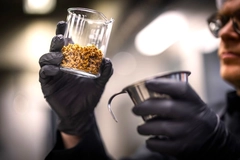
- Industry news
Industry news
- Category news
Category news
- Reports
- Key trends
- Multimedia
- Journal
- Events
- Suppliers
- Home
- Industry news
Industry news
- Category news
Category news
- Reports
- Key trends
- Multimedia
- Events
- Suppliers

Few things are more organic than growing your own renewable fuel like Tequila CAZADORES® does in the picturesque Highlands of Jalisco, Mexico. The premium tequila brand's fairly new, massive biomass boiler sits juxtaposed to the peaceful, rolling Arandas hills and fields ridged and furrowed with red earth and orderly lines of spiky blue-leaved agave plants. Nothing goes to waste here. The plants are used to make the liquid and power the distillery. With parts large enough for groups of people to walk through, and a colossal arrangement of pipes and rugged engineering, the new boiler at the Tequila CAZADORES distillery is 100% biomass fueled and is a model of forward-thinking, eco-conscious ingenuity.

The Arandas-based Tequila CAZADORES distillery's biomass boiler harnesses every bit of green energy it can from the discards made during regular production of the brand's top-shelf spirits. But the "greening" doesn't stop there as the ashes created within the boiler are used for composting, transforming the ashes into a nutrient-rich soil supplement.
About 60% of the biofuel used to produce the world-renowned Tequila CAZADORES, known for using only blue agave, comes from spent agave fibers, which equates to about 11,000 tons a year. The other 40% is made up of about 8,000 tons of carbon-neutral, renewable fuel sources such as clean waste wood, biomass briquettes, sawdust, coconut shell, and tree cuttings. In fact, half of the biomass used comes from what used to be considered waste. Together, the organic materials fill the enormous biomass boiler where they are transformed into the fuel needed to generate the steam power required for the agave sugar extraction process, cooking and distillation of the brand's tequila, using the same original recipe from 1922.
As part of the Bacardi portfolio of premium spirits brands, Tequila CAZADORES is doing its part to advance the Company's corporate responsibility to be "Good Spirited." The Arandas tequila distillery, established in 1973, adeptly reduced greenhouse-gas (GHG) emissions by more than 80% when it swapped out the two fossil-fuel dependent boilers that used 2,000 tons of heavy fuel oil each year for the new, clean-burning biomass boiler. This GHG reduction is equivalent to 6,500 tons of CO2. However, the benefits of the conversion didn't stop there—the new boiler also reduced noise pollution by about 20% compared to the old boilers.










